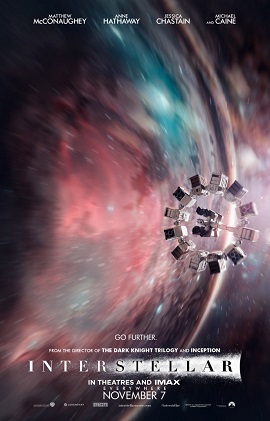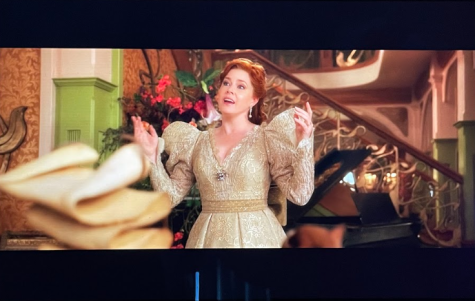‘Interstellar’ triumphs with its spectacle

Photo via wikimedia.org under Creative Commons License
The Endurance spacecraft emerging a black hole in Interstellar.
Since about 2007, the marvelous auteur Christopher Nolan and his brother Jonathan have been intensively researching the astronomical studies of theoretical physicist Kip Thorne. With his scientific analysis, they’ve managed to manifest the phenomenal sci-fi epic that is Paramount Pictures and Warner Bros.’s Interstellar.
This intricate tale intergalactic exploration takes place on a dystopian Earth that’s severely devoid of resources. The economy has been reduced to a largely agricultural state, that is, until retired spacecraft pilot/engineer Cooper (Matthew McConaughey) discovers a hidden Laboratory run by NASA. He’s recruited to leave our solar system in search for habitable planets that the population of Earth can transfer to. Accompanied by Amelia Brand (Anne Hathaway), the daughter of the professor who organized this mission (Michael Caine), they embark on their exodus from their galaxy to save mankind.
The cast is great, as they are in all of Nolan’s films, but if anyone here is the star, it’s Nolan. He’s a true visionary without a doubt, and his implementation of authentic sets and the decision of shooting in the 70mm film format capture these beautifully surreal environments in a way that green screens never could. His practicality and ambition as a filmmaker is incredibly inspirational, even though his ambitions can sometimes be a little too high for their own good.
It’s evident that an abundant amount of thought and analysis went into the screenplay here, but that’s actually where one of the major problems lie. The sheer level of complexity and scope is just far too grand for an audience with a mere three-hour window to fully absorb. This is definitely a film that demands heavy pondering and focus even after it has ended, but that doesn’t detract too much from the overall experience. What does diminish the ultimate success of the film, however, is the forced emotional aspects involving Cooper’s family and the far too tidy, riskless finale.
That being said, there’s still much to marvel over. The perilous sequences involving the exploration vessel are absolutely breathtaking and Hans Zimmer’s gloriously bombastic score brilliantly builds up tension during both the exciting scenes and the more quiet ones. Overall, the film is more successful than it is unsuccessful and fits perfectly into Nolan’s strong filmography.

INTERESTS/HOBBIES: Inter-dimensional travel.
EXTRACURRICULAR ACTIVITIES: Stopping Dr. Doom.
THREE WORDS TO DESCRIBE ME ARE: This isn't science.
IN...

















